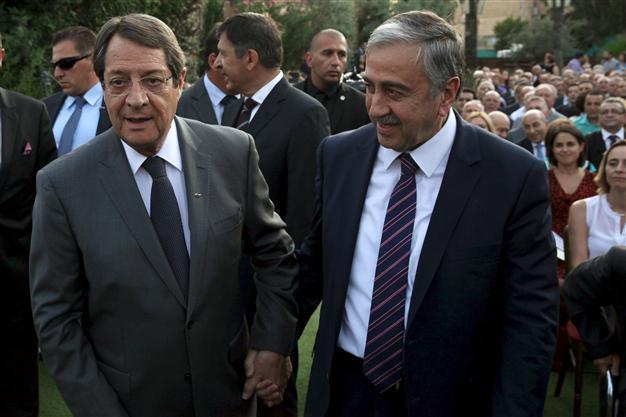Cyprus leaders want EU-based peace settlement
NICOSIA - Agence France-Presse

Turkish Cypriot leader Mustafa Akinci (R) and Greek Cypriot leader, Cypriot President Nicos Anastasiades, hold hands during a bicommunal event organized by the Cyprus Chamber of Commerce and Industry and the Turkish Cypriot Chamber of Commerce in Nicosia July 8, 2015. Reuters Photo
Rival Cypriot leaders said after negotiations on July 10 that any UN-brokered peace settlement for their divided island would be based on European Union principles.President Nicos Anastasiades, the Greek Cypriot leader, and his Turkish Cypriot counterpart Mustafa Akinci met for the sixth time in the UN-controlled buffer zone in Nicosia in the presence of UN envoy Espen Barth Eide.
"The leaders recognise the importance of having the principles and values upon which the European Union is founded upheld and embedded in the comprehensive settlement," UN envoy Espen Barth Eide said in a statement on behalf of President Nicos Anastasiades, the Greek Cypriot leader, and his Turkish Cypriot counterpart Mustafa Akinci.
"The leaders welcome the European Union's commitment to help the achievement of a comprehensive settlement and to prepare for the application of the EU acquis throughout the island," he added.
A divided Cyprus joined the EU in 2004 following a failed peace plan which effectively saw European law only applied in the government-controlled south of the island and not the Turkish-held north.
This was after 75 percent of Greek Cypriots voted against a UN settlement blueprint in a referendum, while Turkish Cypriots voted in favour.
The European Commission president, Jean-Claude Juncker, is expected next week in Cyprus for talks with both leaders, whose meeting in the UN-controlled buffer zone in Nicosia on July 10 was their sixth since Akinci's election in April.
Eide, a Norwegian diplomat, said Juncker's mission would "provide a good opportunity to further underline the European Union readiness to assist the United Nations-led process".
Anastasiades and Akinci have also been discussing the economic dimensions of a reunified Cyprus.
"In today's global economic climate it is essential that a functional, federal Cyprus is financially viable and committed to capitalising on the economic opportunities that will open up as a result of reaching a final settlement," said Eide.
Many believe the good chemistry between the two leaders, who are scheduled to resume talks on July 27, can create a climate of trust in order for an elusive peace accord to be reached.
Key issues that have wrecked previous peace bids are deep-rooted disagreements on territorial adjustments, security, property rights and power sharing in a federal reunited Cyprus.
The latest round of UN-brokered peace talks -- seen as the best chance in years to reunify Cyprus after four decades of division -- were launched on May 15.
Cyprus has been divided since 1974, when Turkish troops occupied its northern third in response to an Athens-inspired coup seeking union with Greece.
















